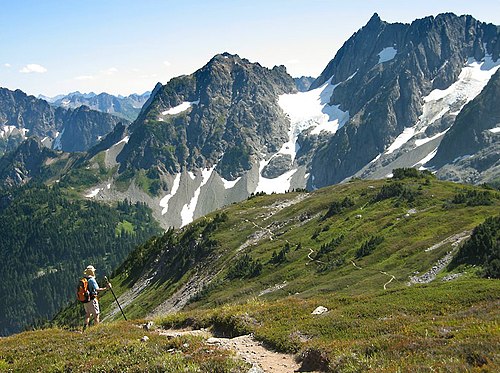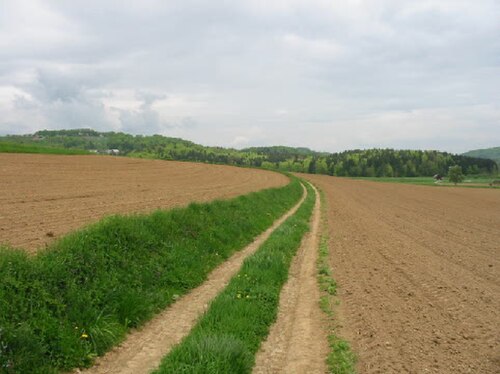Trailverb
(transitive) To follow behind (someone or something); to tail (someone or something).
Trailverb
(transitive) To drag (something) behind on the ground.
Trailverb
(transitive) To leave (a trail of).
Trailverb
(transitive) To show a trailer of (a film, TV show etc.); to release or publish a preview of (a report etc.) in advance of the full publication.
Trailverb
(intransitive) To hang or drag loosely behind; to move with a slow sweeping motion.
Trailverb
(intransitive) To run or climb like certain plants.
Trailverb
(intransitive) To drag oneself lazily or reluctantly along.
Trailverb
To be losing, to be behind in a competition.
Trailverb
(military) To carry (a firearm) with the breech near the ground and the upper part inclined forward, the piece being held by the right hand near the middle.
Trailverb
To flatten (grass, etc.) by walking through it; to tread down.
Trailverb
(dated) To take advantage of the ignorance of; to impose upon.
Trailnoun
The track or indication marking the route followed by something that has passed, such as the footprints of animal on land or the contrail of an airplane in the sky.
Trailnoun
A route for travel over land, especially a narrow, unpaved pathway for use by hikers, horseback riders, etc.
Trailnoun
A trailer broadcast on television for a forthcoming film or programme.
Trailnoun
(graph theory) A walk in which all the edges are distinct.
Trailverb
To hunt by the track; to track.
Trailverb
To draw or drag, as along the ground.
Trailverb
To carry, as a firearm, with the breech near the ground and the upper part inclined forward, the piece being held by the right hand near the middle.
Trailverb
To tread down, as grass, by walking through it; to lay flat.
Trailverb
To take advantage of the ignorance of; to impose upon.
Trailverb
To be drawn out in length; to follow after.
Trailverb
To grow to great length, especially when slender and creeping upon the ground, as a plant; to run or climb.
Trailnoun
A track left by man or beast; a track followed by the hunter; a scent on the ground by the animal pursued; as, a deer trail.
Trailnoun
A footpath or road track through a wilderness or wild region; as, an Indian trail over the plains.
Trailnoun
Anything drawn out to a length; as, the trail of a meteor; a trail of smoke.
Trailnoun
Anything drawn behind in long undulations; a train.
Trailnoun
Anything drawn along, as a vehicle.
Trailnoun
A frame for trailing plants; a trellis.
Trailnoun
The entrails of a fowl, especially of game, as the woodcock, and the like; - applied also, sometimes, to the entrails of sheep.
Trailnoun
That part of the stock of a gun carriage which rests on the ground when the piece is unlimbered. See Illust. of Gun carriage, under Gun.
Trailnoun
The act of taking advantage of the ignorance of a person; an imposition.
Trailnoun
a track or mark left by something that has passed;
Trailnoun
a path or track roughly blazed through wild or hilly country
Trailnoun
evidence pointing to a possible solution;
Trailverb
to lag or linger behind;
Trailverb
go after with the intent to catch;
Trailverb
move, proceed, or walk draggingly pr slowly;
Trailverb
hang down so as to drag along the ground;
Trailverb
drag loosely along a surface; allow to sweep the ground;
Trail
A trail is usually a path, track or unpaved lane or road. In the United Kingdom and the Republic of Ireland, path or footpath is the preferred term for a walking trail.
Tracenoun
An act of tracing.
Tracenoun
An enquiry sent out for a missing article, such as a letter or an express package.
Tracenoun
A mark left as a sign of passage of a person or animal.
Tracenoun
A residue of some substance or material.
Tracenoun
A very small amount.
Tracenoun
(electronics) A current-carrying conductive pathway on a printed circuit board.
Tracenoun
An informal road or prominent path in an arid area.
Tracenoun
One of two straps, chains, or ropes of a harness, extending from the collar or breastplate to a whippletree attached to a vehicle or thing to be drawn; a tug.
Tracenoun
(engineering) A connecting bar or rod, pivoted at each end to the end of another piece, for transmitting motion, especially from one plane to another; specifically, such a piece in an organ stop action to transmit motion from the trundle to the lever actuating the stop slider.
Tracenoun
(fortification) The ground plan of a work or works.
Tracenoun
(geometry) The intersection of a plane of projection, or an original plane, with a coordinate plane.
Tracenoun
(mathematics) The sum of the diagonal elements of a square matrix.
Tracenoun
(grammar) An empty category occupying a position in the syntactic structure from which something has been moved, used to explain constructions such as wh-movement and the passive.
Traceverb
(transitive) To follow the trail of.
Traceverb
To follow the history of.
Traceverb
(transitive) To draw or sketch lightly or with care.
Traceverb
(transitive) To copy onto a sheet of paper superimposed over the original, by drawing over its lines.
Traceverb
To copy; to imitate.
Traceverb
To walk; to go; to travel.
Traceverb
To walk over; to pass through; to traverse.
Traceverb
To follow the execution of the program by making it to stop after every instruction, or by making it print a message after every step.
Tracenoun
One of two straps, chains, or ropes of a harness, extending from the collar or breastplate to a whiffletree attached to a vehicle or thing to be drawn; a tug.
Tracenoun
A connecting bar or rod, pivoted at each end to the end of another piece, for transmitting motion, esp. from one plane to another; specif., such a piece in an organ-stop action to transmit motion from the trundle to the lever actuating the stop slider.
Tracenoun
A mark left by anything passing; a track; a path; a course; a footprint; a vestige; as, the trace of a carriage or sled; the trace of a deer; a sinuous trace.
Tracenoun
A very small quantity of an element or compound in a given substance, especially when so small that the amount is not quantitatively determined in an analysis; - hence, in stating an analysis, often contracted to tr.
Tracenoun
A mark, impression, or visible appearance of anything left when the thing itself no longer exists; remains; token; vestige.
Tracenoun
The intersection of a plane of projection, or an original plane, with a coordinate plane.
Tracenoun
The ground plan of a work or works.
Traceverb
To mark out; to draw or delineate with marks; especially, to copy, as a drawing or engraving, by following the lines and marking them on a sheet superimposed, through which they appear; as, to trace a figure or an outline; a traced drawing.
Traceverb
To follow by some mark that has been left by a person or thing which has preceded; to follow by footsteps, tracks, or tokens.
Traceverb
Hence, to follow the trace or track of.
Traceverb
To copy; to imitate.
Traceverb
To walk over; to pass through; to traverse.
Traceverb
To walk; to go; to travel.
Tracenoun
a just detectable amount;
Tracenoun
an indication that something has been present;
Tracenoun
a suggestion of some quality;
Tracenoun
drawing created by tracing
Tracenoun
either of two lines that connect a horse's harness to a wagon or other vehicle or to a whiffletree
Tracenoun
a visible mark (as a footprint) left by the passage of person or animal or vehicle
Traceverb
follow, discover, or ascertain the course of development of something;
Traceverb
make a mark or lines on a surface;
Traceverb
to go back over again;
Traceverb
pursue or chase relentlessly;
Traceverb
discover traces of;
Traceverb
make one's course or travel along a path; travel or pass over, around, or along;
Traceverb
copy by following the lines of the original drawing on a transparent sheet placed upon it; make a tracing of;
Traceverb
read with difficulty;
Traceverb
find or discover by investigation
Traceverb
find or describe the origin or development of
Traceverb
follow or mark the course or position of (something) with one's eye, mind, or finger
Traceverb
take (a particular path or route)
Traceverb
copy (a drawing, map, or design) by drawing over its lines on a superimposed piece of transparent paper
Traceverb
draw (a pattern or line), especially with one's finger or toe
Traceverb
give an outline of
Tracenoun
a mark, object, or other indication of the existence or passing of something
Tracenoun
a line or pattern displayed by an instrument to show the existence or nature of something which is being recorded or measured.
Tracenoun
a physical change in the brain presumed to be caused by a process of learning or memory.
Tracenoun
a very small quantity, especially one too small to be accurately measured
Tracenoun
a barely discernible indication of something
Tracenoun
a procedure to investigate the source of something, such as the place from which a telephone call was made
Tracenoun
a line which represents the projection of a curve or surface on a plane or the intersection of a curve or surface with a plane.
Tracenoun
a path or track.
Tracenoun
the sum of the elements in the principal diagonal of a square matrix.
Tracenoun
each of the two side straps, chains, or ropes by which a horse is attached to a vehicle that it is pulling.






























